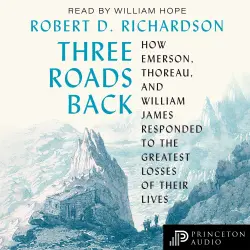
Losing Ourselves - Learning to Live without a Self
Jay L. Garfield
Discover the benefits of shedding the illusion of self-identity in 'Losing Ourselves' by Jay L. Garfield. A transformative audiobook on Buddhism and morality.
Unabridged
6 hours 51 minutes
Note: Costs may be incurred for playing the audio books or audio plays on the respective platforms, e.g. Spotify. Lismio has no influence on which audiobooks and audio plays are available on the service.
Some articles contain affiliate links (marked with an asterisk *). If you click on these links and purchase products, we will receive a small commission at no extra cost to you. Your support helps to keep this site running and to continue creating useful content. Thank you for your support!
From the publisher
This audiobook narrated by Eric Meyers reveals why you don't have a self-and why that's a good thing
In Losing Ourselves, Jay Garfield, a leading expert on Buddhist philosophy, offers a brief and radically clear account of an idea that at first might seem frightening but that promises to liberate us and improve our lives, our relationships, and the world. Drawing on Indian and East Asian Buddhism, Daoism, Western philosophy, and cognitive neuroscience, Garfield shows why it is perfectly natural to think you have a self-and why it actually makes no sense at all and is even dangerous. Most importantly, he explains why shedding the illusion that you have a self can make you a better person.
Examining a wide range of arguments for and against the existence of the self, Losing Ourselves makes the case that there are not only good philosophical and scientific reasons to deny the reality of the self, but that we can lead healthier social and moral lives if we understand that we are selfless persons. The book describes why the Buddhist idea of no-self is so powerful and why it has immense practical benefits, helping us to abandon egoism, act more morally and ethically, be more spontaneous, perform more expertly, and navigate ordinary life more skillfully. Getting over the self-illusion also means escaping the isolation of self-identity and becoming a person who participates with others in the shared enterprise of life.
The result is a transformative book about why we have nothing to lose-and everything to gain-by losing our selves.
In Losing Ourselves, Jay Garfield, a leading expert on Buddhist philosophy, offers a brief and radically clear account of an idea that at first might seem frightening but that promises to liberate us and improve our lives, our relationships, and the world. Drawing on Indian and East Asian Buddhism, Daoism, Western philosophy, and cognitive neuroscience, Garfield shows why it is perfectly natural to think you have a self-and why it actually makes no sense at all and is even dangerous. Most importantly, he explains why shedding the illusion that you have a self can make you a better person.
Examining a wide range of arguments for and against the existence of the self, Losing Ourselves makes the case that there are not only good philosophical and scientific reasons to deny the reality of the self, but that we can lead healthier social and moral lives if we understand that we are selfless persons. The book describes why the Buddhist idea of no-self is so powerful and why it has immense practical benefits, helping us to abandon egoism, act more morally and ethically, be more spontaneous, perform more expertly, and navigate ordinary life more skillfully. Getting over the self-illusion also means escaping the isolation of self-identity and becoming a person who participates with others in the shared enterprise of life.
The result is a transformative book about why we have nothing to lose-and everything to gain-by losing our selves.








